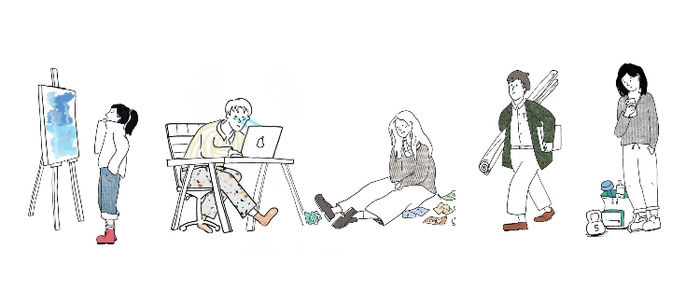The science of burnout
As we near the end of term, Sophie Head explores the psychology behind burnout and why some people are more prone to it than others

The midpoint of term has passed, and the feeling that term is everlasting has descended upon many, the slippery slope of evaporating self-care only getting worse. Recognising and understanding the science of burnout is crucial to nip it in the bud and avoid forming a habit of giving it your all in the first half of term and then hibernating in the second half – as many before me have said, it is a marathon, not a sprint. While stars burnout eventually via nuclear fusion, it should not be a guaranteed experience for Cambridge students.
The term "burnout syndrome" was coined in the 1970s by American psychologist Herbert Freudenberger. First used to describe the inescapable chronic fatigue experienced by doctors and nurses, it has now been officially recognised by the World Health Organisation in 2019 as a syndrome. Described as “chronic workplace stress that has been not successfully managed”, this alludes to physical and emotional exhaustion and resultingly not being able to keep up with work demands.
Flashback to my first supervision – my supervisor told us that I must be neurotic, as all Cambridge students are. According to the American Psychological Association, a neurotic personality type is characterised by a chronic level of emotional instability and proneness to psychological distress. Once the initial panic faded, I realised there might be some truth to his bizarre statement. While there’s no evidence to back this and would be a questionable study if it ever did occur, his words did make me question if students here are destined to burn out. This "inevitability" of burnout – if you were to be so pessimistic – may not just be because of the chaotic essay/problem sheet factory but instead the type of people that are drawn to study at Cambridge. In some studies, burnout has been more strongly linked to neuroticism than work-contextualised factors. Applicants and eventual students could be more vulnerable to burnout and mental health issues as a subcategory of a neurotic personality type and may often be engaged in attempting perfection beyond the realms of attainability.
“The most dangerous element may be the failure and naivety to acknowledge the burnout and prevent it from worsening”
This is purely speculation and does not diminish the need for interventions at college, subject, and university levels, as the blame cannot be passed from the institution to the individual. The knowledge that this university may attract people more at risk of burnout and maladaptive perfectionism only increases the need for university-wide interventions. Burnout may come across as inherent to the experience of a Cambridge student, but this only makes the issue trivial and harder to deal with.
There are three components to burnout – exhaustion, cynicism, and reduced professional efficacy. Perhaps surprisingly, the most dangerous element may not be exhaustion, but instead the failure and naivety to acknowledge the burnout and prevent it from worsening or becoming habitual. The build-up of academic deadlines, long class schedules, and the pressure of being a "well-rounded student" who engages in every extracurricular there is lends only to it being a question of not if, but when.
“Burnout may come across as inherent to the experience of a Cambridge student, only making the issue harder to deal with”
Spoon theory, developed by Christine Miserandino in 2003, was a gamechanger for how I viewed myself as more prone to burnout. My journey with anxiety, depression, and ADHD had led me not to forgive my “laziness” and inability to do simple, necessary things such as cook, tidy, and shower. My ADHD means sometimes I may bite off way more than I can chew, as I struggle to say no or set boundaries due to rejection-sensitive dysphoria, where one may be more prone to people pleasing and more sensitive to rejection. Spoon theory uses the metaphor of spoons to visualise exhaustion and energy supplies: spoons demonstrate finite energy resources and that, when chronically ill or burnt-out, the amount of energy needed to complete supposedly easy, everyday tasks may be more than expected. For instance, everybody has ten spoons or "units" of energy to complete tasks throughout the day. To wake up, shower, and eat breakfast may require only one spoon for most people. Yet, when you are burnt-out, chronically ill, or disabled, it may take you three spoons to finish the same action. Equally, burnout and disabilities often come with disrupted sleep patterns, so spoons cannot be replenished in the same way for all. Pagnin & colleagues investigated emotional exhaustion, daytime sleepiness, cynicism, and academic efficacy, finding a bidirectional relationship between sleep and burnout symptoms. Put simply, burnout damages sleep patterns, and sleep patterns can breed more intense burnout.
Research into burnout may highlight the steps educators can make to reduce the frequency and intensity of burnout and linked mental health issues. For example, stress management and sleep education should be delivered by college staff, not by JCR welfare who do not feel equipped or are too pressured to give this guidance to peers. As burnout is linked to wider mental health, it would be sensible for college tutors and other pastoral staff to take a mental health first aid course, which has been shown to increase knowledge regarding mental health, decrease negative attitudes, and increase supportive behaviour. At a minimum, an investigation into the efficacy of the increasingly political implementation of a reading week at Cambridge may also allow students to pace their work and not burn out once week five hits. Equally, tutors should support students to move deadlines or scrap some entirely to complete the term in a somewhat liveable state.
While enjoyable, and recommended if you feel like it, the typical "self-care tips" that plague most burnout articles will not solve the issue. A face mask feels nice, but it does not cure underlying mental issues and so understanding the science may help tackle it at an institutional level. Saying "no" when we are overloaded with commitments may also be a vital tool, but last I checked, saying no to every supervision or lecture might not be for the best either.
 News / University Council rescinds University Centre membership20 February 2026
News / University Council rescinds University Centre membership20 February 2026 News / Hundreds of Cambridge academics demand vote on fate of vet course20 February 2026
News / Hundreds of Cambridge academics demand vote on fate of vet course20 February 2026 News / Judge Business School advisor resigns over Epstein and Andrew links18 February 2026
News / Judge Business School advisor resigns over Epstein and Andrew links18 February 2026 News / Union cancels event with Sri Lankan politician after Tamil societies express ‘profound outrage’20 February 2026
News / Union cancels event with Sri Lankan politician after Tamil societies express ‘profound outrage’20 February 2026 News / Caius students fail to pass Pride flag proposal20 February 2026
News / Caius students fail to pass Pride flag proposal20 February 2026










